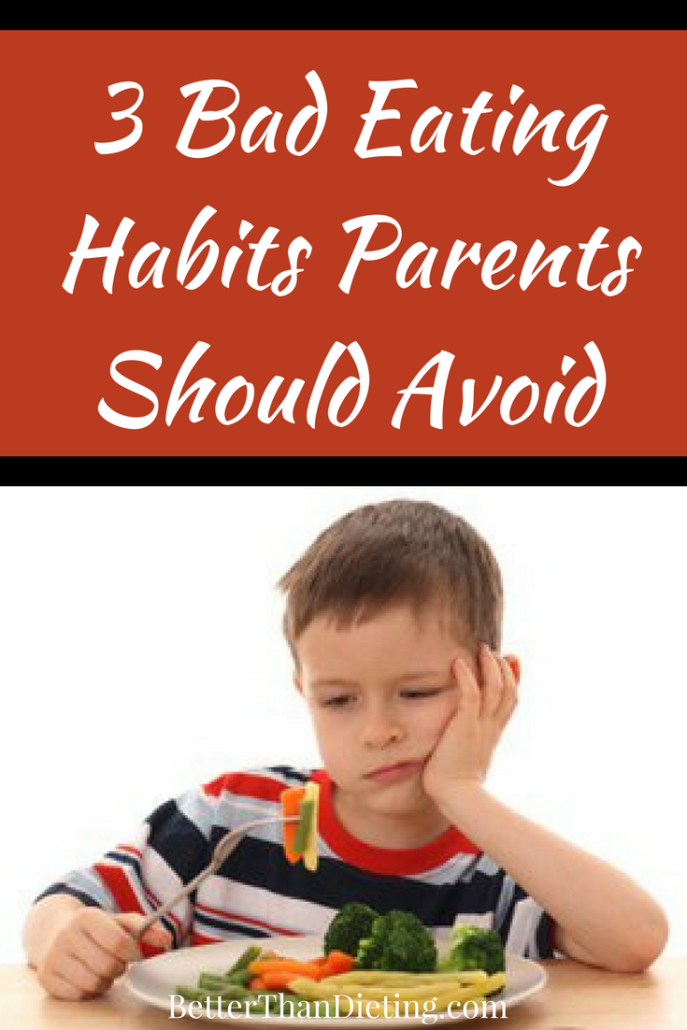As a parent, you’ve probably realized by now that your kids are always watching you. There’s basically nothing that gets past them, and unfortunately, that includes your relationship with food.
If you make substantial changes to your habits, from how much food you’re eating to what you choose to eat, your children — no matter their age — will notice.
While you may be dieting, it’s important to always message that you’re trying to have better eating habits, or that you’re simply trying to be healthier. Your overall goal should be to set a great example for your children about how to think about food and manage your weight.
That said, there are certain situations and phrases you should specifically avoid. Here are three real-life scenarios my patients have experienced, and I think a lot of people can relate.

1. NOT EATING DINNER, BUT PICKING FOOD OFF YOUR KID’S PLATE
One of my patients admitted that she didn’t eat dinner because she wanted to lose weight, but basically picked off her child’s plate instead of feeding herself. This is so common that I call it “air food,” since people often treat food that went through the air and never landed on a plate as having calories that don’t count.
While this behavior seems fine with toddlers, it can become more dysfunctional as the kids got older.
Not only would the kids comment on mom not eating dinner, but worst of all when she tried to pick off her oldest son’s plate, he slammed his fork down and said, “Mommy, get your own!” She had no idea what to do then.
CHANGE THE HABIT: If you want to eat something that your child is eating, get your own helping and put it on your own plate. If it’s a high-calorie food, make sure it’s worth gaining weight from and savor every bite.
Otherwise, repeat to yourself these three essential little words: “It’s not mine.” Instead, choose something that comes without guilt as a side dish.
2. EATING WHILE STANDING IN FRONT OF THE FRIDGE
You may not realize how important it is to set an example when setting the table. If parents have poor habits — like standing in front of the fridge and picking at a variety of foods before dinner — the kids will notice.
Children believe that their parents’ behavior is normal. Your kids don’t know anything different than what’s going on in your house. That’s what’s normal and acceptable behavior.
CHANGE THE HABIT: If your stomach is rumbling when you get home from work and dinner is not ready, have a few go-to snacks available that you can take out of the fridge, put on a plate and sit down and enjoy. Crunchy veggies and salsa make a perfect appetizer that you can even share with your child.
Not only does this behavior encourage them to choose veggies as a low-calorie, nutritionally loaded option, but it also teaches to them to give food the time and attention it deserves.
3. OBSESSING OVER YOUR WEIGHT OR SIZE
Another mom patient of mine constantly asked her teenage daughter if she looked “fat” in her clothing.
Teenagers, particularly girls, are super sensitive about self image and body weight. As a parent, you need to be there as a resource for consistent, clear and helpful messages encouraging attaining and maintaining a healthy body, without underscoring your own insecurities and negative self-talk.
CHANGE THE HABIT: When we shift the cultural message from something negative (fat is bad, skinny is good) to something more positive (eating nutritious foods makes us feel and look better) we avoid sending our children distorted messages about eating, body image and health in general — so everyone wins.
If you really want your child’s opinion about how you look in a particular outfit, ask the question, “Do you think this dress is flattering?” or “What do you think of this dress?” to shift the conversation from one of personal judgment to an objective view regarding an article of clothing.
This story was originally posted on TODAY.com
https://www.today.com/search?query=bonnie+taub-dix


